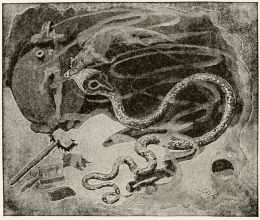When the Anglosphere Began to Hate
Posted By Jim Goad On In North American New Right | Comments Disabled [1]
[1]W. H. Drake, “Then Rikki-Tikki was battered to and fro as a rat is shaken by a dog,” from The Jungle Book, 1895.
1,479 words
Allow me to share a deep character flaw of mine that it took nearly six decades to realize but only moments to rectify.
Despite outward appearances and an intensely unsavory public reputation, the sad truth is that I’m way too nice — all the way to the point where I’m not.
I’ve displayed the same pattern with both lovers and friends — I launch into friendships and romance being as absolutely generous as possible until suddenly I stop when I realize it’s not being reciprocated.
When Church of Satan leader Anton Lavey died, his daughter told reporters [2], “He said his epitaph should be. . . ‘I only regret the times that I was too nice.’”
I know the feeling.
A psychologist once told a friend of mine that his behavior indicates he’s a “bottler” — he lets people step on him to the point where the bottled-up resentment finally explodes.
That’s been my consistent modus operandi until very recently. I will let someone step on me until I lose my temper, and in the process, I wind up looking like the bad guy. In a very sad and pathetic way that’s difficult to admit, I suspect I may wind up finally assuming the bad-guy role to take the heat off of the person who’s been mistreating me for so long.
My most infamous display of this behavioral pattern was the one that landed me in prison. This is from a 1997 phone call I recorded between me and my then-mistress. Tone doesn’t translate well to text, but my tone throughout this call was one of measured exasperation, where she was lighthearted, goofy, and utterly unconcerned with my exasperation:
JIM: I was talking to [Sean] Tejaratchi earlier tonight, before I even picked you up, and he asked me why did I think people like Debbie and you were attracted to me, and I couldn’t say why. And he says he thinks it’s because these are people who feel disgusting and nobody understands them, and I accept them. It’s typical Tej.
ANNE: Do you think that’s the truth?
JIM: Yeah, I think so.
ANNE: [unintelligible] You should be a motivational speaker or something. . . . You’re a little shepherd.
JIM: Oh, Christ.
ANNE: You are! You’re a protector. You’re a shepherd of the mentally ill.
I’d dealt with this level of harassment [3] from that mentally ill skank for a solid year until the night I finally snapped. And after I’d realized that maybe she WAS disgusting and that no one SHOULD understand or accept her, she went full borderline personality disorder and set up her humble shepherd for slaughter.
I sat stewing in prison, being virtually alone in the realization that I was not the aggressor until I abruptly became the aggressor once I grew tired of being aggressed upon. I remember thinking that I would much rather be the unflinching, bulldozing, abusive asshole I was commonly perceived to be, because there’s at least some power and control in that role.
 [4]
[4]You can buy Jim Goad’s Whiteness: The Original Sin here [5].
Around this time, it was not pleasant to hear a friend of mine break the truth to me about my first marriage — one where, at the end, I managed to make myself look like the absolute unmitigated monster because over the course of nearly twelve years I was too kind until I suddenly wasn’t. He said that when he first met the two of us, it was immediately apparent that I cared for her and that she didn’t care at all about me.
It’s tough to admit that you’re so lonely you’d put up with an absolute Medusa of a woman. It’s hard to concede that you may be so starved for friendship that you’ll be friends with people who wind up sucking every last drop of goodwill out of you.
But the moment you’re tough enough to admit it, the rest is easy.
I recall a girlfriend of mine from about eight years ago who, after one of our countless arguments, told me that I get into arguments with everyone.
I had no immediate comeback, but a day later, I realized I’ve had friends for a quarter-century with whom I’ve never argued. So what was the difference between them and her?
The difference was that if they were aware I’d been up all night writing and needed at least a half-hour’s worth of sleep before we drove back to Atlanta, they’d be considerate enough to stay quiet or go for a walk or anything besides sitting right next to me as I finally fell asleep, flip open their laptop, and start laughing at the top of their lungs at cat videos.
To come at the hackneyed “There are two kinds of people in the world” cliché from a completely different angle, I’ll say that if long and hard experience has taught me anything, it’s that the world can be divided into people who interpret your kindness as kindness and those who interpret it as weakness.
Perhaps I was born socially naive, or maybe no one ever told me to treat people with suspicion until they’ve earned my trust. I recall a psychologist I used to see while I was in college. When I asked him, “I’ve been coming here a few months — what’s your general take on me?” his response was, “I think no one ever really sat you down and told you how life works.”
Again and again, I am Charlie Brown and the world is Lucy with a football [6], snatching it away at the last minute and causing me to land on my ass.
I think part of my problem was a stubbornly naive refusal to accept how shallow and rotten and self-serving most people are. Despite so much experience suggesting that’s exactly how most people are, it still seemed too overwhelming to be real, and I preferred to pretend human nature was better than it really is.
But one reaches a point in his life — assuming he’s even capable of self-reflection — where such excuses are no longer viable, because life has a way of teaching you the lessons your parents may have failed to teach you.
It’s best to admit you’ve been a bit of an idiot than to deny it and become a full-blown, late-stage idiot.
It’s best to correct your flaws before they cripple you.
To rework an often misattributed [7] quote, it’s better to admit you’ve been a fool than to double down and become a fool for life.
I’ve decided, heading into my seventh decade next month, to entirely purge my life of those who interpret my kindness as weakness.
Long experience has led me to believe that people who are inconsiderate are incurable. If you have to tell them to be considerate once, you’ll have to keep telling them EVERY time. I’ve never seen an exception to this rule. The very fact that you have to tell them to be considerate even once signals that you are dealing with someone who may as well be a different species than you.
I’ve learned not to erupt anymore. If someone proves unworthy of my friendship or love, I very gently cut them out of my life like a surgeon coldly excising a tumor and dispassionately casting it into a wastebasket.
Now my task is learning how to not let anyone take advantage of my kindness for so long that I’m even tempted to lose my temper.
What, you may ask, does any of this sobbing confessional have to do with white people?
It’s because I see myself as a metaphor for how white people are behaving in the face of endless disregard from nonwhites.
“The Beginnings [8]” is the name of a 1917 poem by Rudyard Kipling that has been mangled and misrepresented online as “The Wrath of the Awakened Saxon [9].” But Kipling actually hated Saxons, especially after he lost his son at the hand of Germans in World War I. The poem is about how the Anglos rather than the Saxons are very slow to anger but are brutal once that anger is roused. A sample verse:
It was not part of their blood,
It came to them very late,
With long arrears to make good,
When the English began to hate.
Although there’s endless quibbling about who exactly is white and who isn’t, I think a fair definition is that anywhere outside of Europe, it refers to the people of the European diaspora who speak English in countries such as the United States, Canada, and Australia — i.e., the Anglosphere.
Will the suicidally altruistic white people of the Anglosphere finally learn to hate — the good, productive, self-serving kind of hate — when they realize how thoroughly they’ve been cowed and gaslit?
And if that day comes, what happens the day after?